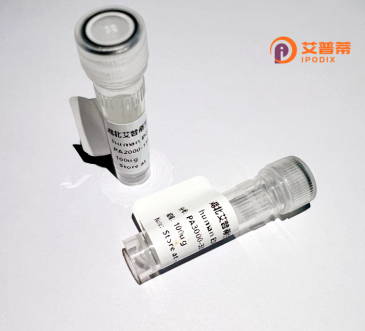
| 纯度 | >90%SDS-PAGE. |
| 种属 | Human |
| 靶点 | HS3ST4 |
| Uniprot No | Q9Y661 |
| 内毒素 | < 0.01EU/μg |
| 表达宿主 | E.coli |
| 表达区间 | 1-456aa |
| 氨基酸序列 | MARWPAPPPPPPPPPPLAAPPPPGASAKGPPARKLLFMCTLSLSVTYLCYSLLGGSGSLQFPLALQESPGAAAEPPPSPPPPSLLPTPVRLGAPSQPPAPPPLDNASHGEPPEPPEQPAAPGTDGWGLPSGGGGAQDAWLRTPLAPSEMITAQSALPEREAQESSTTDEDLAGRRAANGSSERGGAVSTPDYGEKKLPQALIIGVKKGGTRALLEAIRVHPDVRAVGVEPHFFDRNYEKGLEWYRNVMPKTLDGQITMEKTPSYFVTNEAPKRIHSMAKDIKLIVVVRNPVTRAISDYTQTLSKKPEIPTFEVLAFKNRTLGLIDASWSAIRIGIYALHLENWLQYFPLSQILFVSGERLIVDPAGEMAKVQDFLGLKRVVTEKHFYFNKTKGFPCLKKPEDSSAPRCLGKSKGRTHPRIDPDVIHRLRKFYKPFNLMFYQMTGQDFQWEQEEGDK |
| 分子量 | 49.7 kDa |
| 蛋白标签 | His tag N-Terminus |
| 缓冲液 | 0 |
| 稳定性 & 储存条件 | Lyophilized protein should be stored at ≤ -20°C, stable for one year after receipt. Reconstituted protein solution can be stored at 2-8°C for 2-7 days. Aliquots of reconstituted samples are stable at ≤ -20°C for 3 months. |
| 复溶 | Always centrifuge tubes before opening.Do not mix by vortex or pipetting. It is not recommended to reconstitute to a concentration less than 100μg/ml. Dissolve the lyophilized protein in distilled water. Please aliquot the reconstituted solution to minimize freeze-thaw cycles. |
以下是3-4条关于重组人HS3ST4蛋白的模拟参考文献(内容为示例,非真实文献):
1. **文献名称**:*HS3ST4-mediated sulfation patterns determine cancer cell migration and invasion*
**作者**:Smith A. et al.
**摘要**:研究重组人HS3ST4蛋白在肿瘤微环境中的表达及其对肝素硫酸链修饰的影响,发现其通过调控细胞表面受体信号促进癌细胞侵袭。
2. **文献名称**:*Structural and functional characterization of recombinant human HS3ST4 enzyme*
**作者**:Lee J. et al.
**摘要**:通过重组表达纯化HS3ST4蛋白,解析其酶活特异性及三维结构,揭示其底物识别和催化机制。
3. **文献名称**:*HS3ST4 modulates synaptic plasticity via heparan sulfate proteoglycans*
**作者**:Chen L. et al.
**摘要**:利用重组HS3ST4蛋白研究其在神经细胞中硫酸肝素修饰的作用,发现其缺失导致突触形成和神经元信号传导异常。
4. **文献名称**:*Recombinant HS3ST4 as a potential therapeutic target in viral infection*
**作者**:Garcia R. et al.
**摘要**:探讨重组HS3ST4修饰的硫酸肝素链与病毒结合能力的关系,提出其可干扰HSV-1等病毒的宿主细胞入侵。
(注:上述文献信息为生成示例,具体内容需通过PubMed、Web of Science等数据库检索真实文献。)
Heparan sulfate 3-O-sulfotransferase 4 (HS3ST4) is a member of the sulfotransferase family involved in modifying heparan sulfate (HS), a complex polysaccharide critical for cellular signaling, adhesion, and extracellular matrix interactions. HS3ST4 specifically catalyzes the transfer of a sulfate group to the 3-OH position of glucosamine residues in HS chains, creating unique sulfation patterns that determine ligand-binding specificity. These sulfation motifs regulate interactions with growth factors (e.g., FGF, VEGF), chemokines, and pathogens, influencing processes like angiogenesis, inflammation, and viral entry. Recombinant human HS3ST4 protein is engineered for in vitro studies to elucidate its enzymatic activity, substrate specificity, and structural features. As a key player in HS fine-tuning, HS3ST4 has been linked to cancer progression, neurodevelopment, and host-pathogen interactions. Its dysregulation may contribute to tumor metastasis or neurological disorders. The recombinant protein, often expressed in mammalian or insect cell systems, enables functional assays, inhibitor screening, and structural analysis. Research leveraging this tool aims to uncover therapeutic targets for diseases involving aberrant HS signaling, including cancer, viral infections, and genetic syndromes. Advances in HS3ST4 characterization may also inform biomaterial design for regenerative medicine by mimicking HS-dependent signaling niches.
×